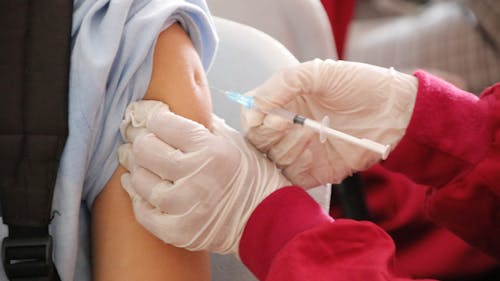Rutgers study will test bivalent coronavirus vaccine efficacy for children younger than 5

Rutgers is working with Pfizer-BioNTech to conduct a study regarding the safety of bivalent coronavirus disease (COVID-19) vaccines in young children, according to an article from Rutgers Today.
Bivalent vaccines contain material from both the original COVID-19 strain and more recent strains, according to the Food and Drug Administration. This allows the vaccine to provide broader protection against multiple COVID-19 strains.
Rutgers is just one site that was chosen to run trials for the broader study. The University's trial will consist of two substudies — one will examine the effects of the bivalent vaccine on children younger than 5 years old who have previously received vaccine doses, and the other will examine children younger than 2 years old who have never been vaccinated against COVID-19, according to the article.
Currently, anyone younger than the age of 5 is only eligible for monovalent COVID-19 vaccines which only contain a single strain. The researchers will administer multiple doses of the vaccine to participants and monitor their reactions by performing blood tests and swabbing them to look for traces of the COVID-19 pathogen, according to the article.
Simon Li, an associate professor of pediatrics at Rutgers Robert Wood Johnson Medical School and a lead researcher for this study, said Rutgers was originally chosen to conduct COVID-19 vaccine studies due to the reputation of Jeffrey Carson, the provost of Rutgers Biomedical and Health Sciences.
He said that Carson and his team of researchers had first been approached by Johnson and Johnson, who asked Carson to conduct a COVID-19 vaccine trial due to his reputation for facilitating efficient trials.
In August 2021, the Rutgers Pediatric Clinical Research Center was contacted by multiple companies and ultimately decided to partner with Pfizer to study the efficacy of monovalent COVID-19 vaccines, according to Li.
To continue the center’s relationship with Pfizer-BioNTech, Li said his team sought to partner again with the company for this COVID-19 vaccine study. Li said that the study is important due to the growing danger of the virus.
“It’s very obvious and it’s very clear that the virus is changing and mutating consistently, and with those variants, I think it is really important that we look at the potential of having vaccines that are able to be more than a single variant attack,” he said.
Li said that he believes a bivalent vaccine, safe for children younger than 5, would be more effective in fighting COVID-19 variants than the current monovalent vaccine available.
Li said that Pfizer-BioNTech will compare Rutgers’ results with the results from the multiple other trial sites to come to a conclusion on the efficacy of the bivalent vaccine in children younger than age 5. After this, they will likely apply for the vaccine to be administered for emergency use authorization.
“I think this is something that is really unique and very important, and I think everybody thinks that, and our team at Rutgers really likes to partner with research that makes sense so we can make a difference,” Li said.



